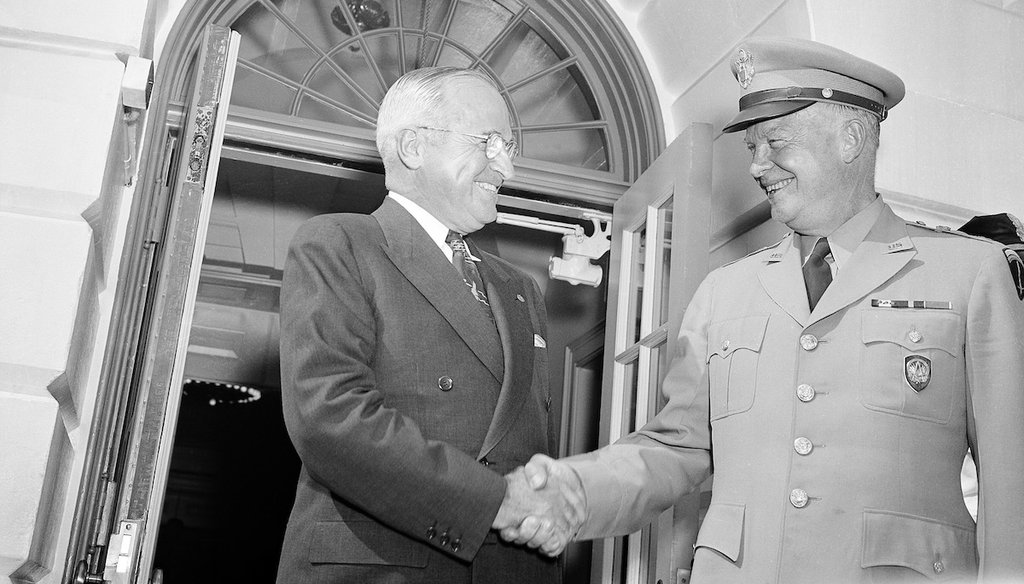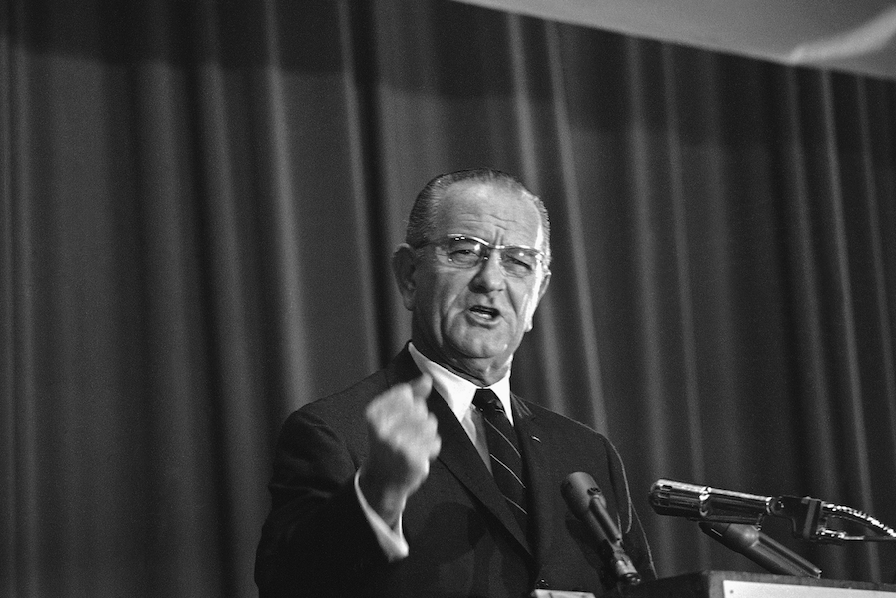Stand up for the facts!
Our only agenda is to publish the truth so you can be an informed participant in democracy.
We need your help.
I would like to contribute

President Harry Truman greets Gen. Dwight Eisenhower at the White House on June 1, 1952. Truman declined to run for a new term; Eisenhower won the election to succeed him later that year. (AP)
If Your Time is short
-
No major presidential candidate has dropped out of the race this close to Election Day, or after all the primaries are over.
-
Incumbent presidents Harry S. Truman and Lyndon B. Johnson both bowed out of their second-term campaigns after poor performance in early primaries. But both dropped out in March, with over 200 days left before the election.
-
The Democratic nominee will be formally selected by delegates at the Democratic National Convention, running Aug. 19 to Aug. 22 in Chicago, but Joe Biden’s endorsement of Kamala Harris is likely to carry significant weight, experts say.
By now, most of us are used to living in "unprecedented times." But just how unprecedented is Joe Biden’s decision to drop out of the 2024 presidential race a little more than three months before Election Day?
Occasionally, incumbent presidents have decided to not seek reelection. But dropping out midcampaign is incredibly rare. And it has never happened this close to an election.
Biden’s decision is a "huge earthquake," said David Greenberg, a presidential historian at Rutgers University.
John J. Pitney Jr., a professor of American politics at Claremont McKenna College, said, "There is no good analogy."
The two closest political shake-ups to Biden’s were withdrawals by President Harry S. Truman before the 1952 election and President Lyndon B. Johnson before the 1968 election.
Sign up for PolitiFact texts
Both Truman and Johnson had assumed office following a president’s death and served a full term of their own; they each would have been eligible to run for a second full term had they wanted to. But following poor showings in each of their respective New Hampshire primaries in 1952 and 1968, both exited the race.
Truman withdrew his name from the presidential election on March 29, 1952, or 220 days before Election Day. Truman, who was suffering from low popularity amid the Korean War, dropped out less than three weeks after losing the New Hampshire primary. (In that era, there were relatively few primaries; in many states, party insiders controlled the nomination process.)
Ultimately, Adlai Stevenson II won the Democratic nomination but lost in the general election to Dwight Eisenhower, a five-star U.S. Army general from World War II who ran as a Republican.
President Lyndon B. Johnson speaks Sept. 28,1968, in Washington. (AP)
Johnson dropped out of the race March 31, 1968, 219 days before the election. Johnson — who had become broadly unpopular because of another war, Vietnam — had not formally filed to run, and was on the New Hampshire ballot only as a write-in. But after a poor showing, and facing primary challenges from two strong contenders, Eugene McCarthy and Robert F. Kennedy, Johnson dropped out.
In the end, Johnson’s vice president, Hubert Humphrey, was nominated but lost the general election to Richard Nixon.
Biden’s move is far closer to Election Day — 107 days — and comes after all Democratic voters have had their say in the presidential primaries.
A few other examples are even less similar to Biden’s.
President Calvin Coolidge forswore another term, but he did so with 15 months to go, in summer 1927, Greenberg said.
In 1976, Republicans headed into their convention in Kansas City, Missouri, without knowing whether their nominee would be the incumbent president, Gerald Ford, or the conservative insurgent Ronald Reagan. Ford won the nomination but lost the general election to Democrat Jimmy Carter; four years later, Reagan won the nomination and the presidency.
How will delegates decide?
Now, the formal decision over Biden’s successor as nominee is left to the delegates attending the Democratic National Convention, running Aug. 19 to Aug. 22 in Chicago.
When voters cast ballots during the Democratic primary season, they were technically choosing delegates for a candidate. The delegates allocated will formally decide the successor as nominee during the Democratic convention.
There are about 4,000 regular Democratic delegates earned from primary results and more than 700 "superdelegates" consisting of party officers and elected officials.
The rules allow for delegates to vote their consciences, but because these delegates are almost entirely pledged to Biden, his endorsement of Harris should carry significant weight, experts said.
Biden’s quick Harris endorsement may even be enough to keep alternative contenders from seeking the nomination.
There will need to be a separate contest to select the vice presidential nominee. The same delegate voting system holds for the vice presidential nomination as it does for the presidential nomination.
RELATED: Joe Biden drops out, endorses Kamala Harris. How do the Democrats choose a 2024 nominee now?
RELATED: Read Joe Biden’s letter her
Our Sources
PolitiFact, "Joe Biden drops out of 2024 presidential race. Read PolitiFact's updating coverage," July 21, 2024
Britannica.com, "Have Any U.S. Presidents Decided Not to Run For a Second Term?," July 21, 2024
The New York Times, "Truman and Johnson Also Stepped Aside, but ‘the Circumstances Are Quite Different’," July 21, 2024
CNN, "Analysis: There is no direct precedent for Biden dropping out now. Here’s the history," July 21, 2024
Politico, "Truman declines to seek another term, March 29, 1952," March 29, 2019
The Washington Post, "Can Haley be like Ike? New Hampshire's primacy began with 1952 upsets," Jan 23, 2024
Britannica, "United States presidential election of 1968," May 31, 2024
Federal Election Commission, "2024 Presidential and Congressional Primary Dates and Candidate Filing Deadlines for Ballot Access," April 25, 2024
The Associated Press, "The presidential primary season is officially over. Here's what the results could mean for November," June 10, 2024
Time Magazine, "The Republican National Convention That Changed the GOP," July 16, 2024
PolitiFact, "Joe Biden drops out, endorses Kamala Harris. How do the Democrats choose a 2024 nominee now?" July 21, 2024
Email interview with John J. Pitney Jr., professor of American politics at Claremont McKenna College, July 21, 2024
Email interview with David Greenberg, historian at Rutgers University, July 21, 2024


































